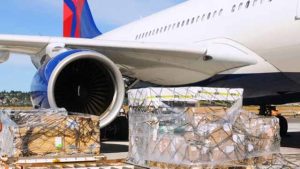By Onome Amuge
The impact of air cargo transport in the exportation of agro commodities and the economic benefits cannot be overemphasised in modern day business transactions as it provides one of the most ideal processes for exporters and importers of perishable commodities to service existing markets and develop new ones.
Beyond the underlying benefits, data shows that demand for transporting agro products by air is becoming increasingly global due to the need for consumers to access the products in their original state devoid of chemical processing and preservation associated with several industrial goods.
Air freight, also known as air cargo, is the process of delivering shipment of goods such as jewelry, perishable items,pharmaceuticals amongst others through an air carrier. It plays a significant role in global trade as it is considered the fastest means of transporting commodities across countries and one of the most efficient ways of meeting the increasing demand from different supply chain dynamics.
According to Marketwatch, a market data online website, the global air freight market size was valued at $299.7 billion in 2022 and is expected to reach $448 billion by 2028, exhibiting a compound annual growth rate (CAGR) of 6.95 per cent between 2023-2028.
However, despite being one of the largest producers of agric products,Nigeria’s goal of actualising an export-driven economy through air cargo is still a far cry from expectations. Reports show that the country loses around $1 billion annually to export opportunities in agro commodities due to lack of operational and investment drive in the industry as well as in the aviation sector.
Moreso, the sector’s share of total trade volume has recorded a trade imbalance as official records show that air cargo imports outweigh exports by a wide margin,reflecting the country’s inability to facilitate more export by air despite the availability of goods in the country.
The Federal Airports Authority of Nigeria (FAAN), in a report, stated that Nigeria’s annual air cargo import stood at about 131 million tonnes, while it exports only 16 million tonnes of commodities by air.
Experts from different subsectors of the aviation industry, who spoke at the second edition of the annual Chinet Aviacargo conference in Lagos,lamented that Nigeria was losing out on the immense opportunities in the air cargo sector due to multiple charges, inadequate infrastructure, extortion and other corrupt practices.
This, they observed, has led to Nigeria’s estimated loss of over $250 millions yearly in revenue in the nation’s air freighting of agro-cargo export produce. They pointed out that several drawbacks in the country’s air cargo value-chain have put the country at a potentially disadvantaged position in the African Continental Free Trade Area (AfCFTA).
The experts also expressed concerns over the consistently empty cargo aircraft departing the country despite huge agro produce from Nigeria. They said that despite the available cargo aircraft to move farm produce to other parts of the world,these produce still lay waste in various states because there is a lack of markets and information.
Alex Nwuba,president, Aircraft Owners and Pilots Association of Nigeria,emphasised the relevance of building cargo airports strategically where there are comparative advantages for traders, farmers and airlines.
According to Nwuba, a major challenge is the information gap that exists in the industry. He added that the federal government ought to provide information on things that are being produced, where the market for those things are and the service providers to enable stakeholders to exploit the opportunities the market offers.
“There are opportunities. The logistics companies have said they have the trucks and means to move goods, the aviation sector said they have the airplanes. We are lacking the information on where things are and the market for those items. We need these market intelligence, so that service providers can take advantage of those opportunities,” he said.
Using Anambra airport as a case study, he said Anambra has a strategy for producing agricultural products and vegetables for domestic and international markets which can be transported at the airport.
“Anambra is a huge industrial and commerce based economy and some of these things that are produced within that economy and taken out of that economy will take advantage of that airport,” he added.
Musa Nuhu, director general of the Nigerian Civil Aviation Authority (NCAA), emphasised the need to attract more Nigerian exports to air transport to minimize losses incurred in cross-border transportation of Nigerian agricultural produce by road.
He,however, noted that priorities need to be placed on infrastructure of designated cargo airports and provision of functional or new-technology driven cargo facilities
Ikechi Ukoh, coordinator of Aviacargo Roadmap Committee,in a recent presentation titled, “Repositioning cargo operations through the development of agriculture and natural resources in Nigeria”, delivered at the Federal Airport Authority of Nigeria (FAAN) National Aviation Conference (FNAC) in Abuja, listed several factors hindering Nigeria’s agricultural sector from the economic potentials in the air cargo transport sector.
According to the air transport expert, the challenges identified inhibiting a successful aviation cargo industry include: Noncompliance of farmers to internationally and domestically accepted standards;lack of certification, lack of access to international markets; lack of knowledge on global requirements,inability to trace, high cost preservation and packaging to global standard, poor logistics, insecurity, poor airport infrastructure, lack of government support; and multiple taxation and many others as factors.

He also pointed out that the federal government’s plans to grow cashew export from $252 million to $500 million for 2023 but non-compliance of farmers to internationally and domestically accepted standards and other issues already enumerated has impeded this.
In his recommendations for improved exportation of agro-commodities by air, he said agricultural exports from Nigeria must start from a farm certified by the Nigerian Agricultural Quarantine Services (NAQS) or a global GAP registered farm through a secured cargo pathway.
Ukoh also called for enhanced certification of farms and operators in the value chain, adding them to insist on the traceability of all exportable produce and tackle the mayhem at the export cargo terminals.







